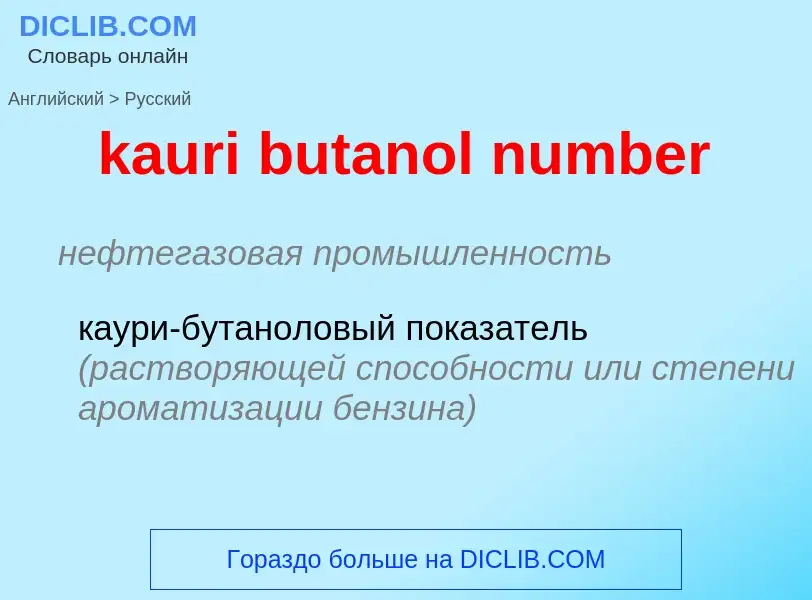Translation and analysis of words by ChatGPT artificial intelligence
On this page you can get a detailed analysis of a word or phrase, produced by the best artificial intelligence technology to date:
- how the word is used
- frequency of use
- it is used more often in oral or written speech
- word translation options
- usage examples (several phrases with translation)
- etymology
kauri butanol number - translation to russian
нефтегазовая промышленность
каури-бутаноловый показатель (растворяющей способности или степени ароматизации бензина)
['kau(ə)ri]
общая лексика
каури
ботаника
агатис (Agathis)
существительное
общая лексика
древесина каури
каури (новозеландское хвойное дерево)
ботаника
каури (Agathis australis)
Wikipedia
The Kauri-butanol value ("Kb value") is an international, standardized measure of solvent power for a hydrocarbon solvent, and is governed by an ASTM standardized test, ASTM D1133. The result of this test is a scaleless index, usually referred to as the "Kb value". A higher Kb value means the solvent is more aggressive or active in the ability to dissolve certain materials. Mild solvents have low scores in the tens and twenties; powerful solvents like chlorinated solvents and naphthenic aromatic solvents (i.e. "High Sol 10", "High Sol 15") have ratings that are in the low hundreds.
In terms of the test itself, the kauri-butanol value (Kb) of a chemical shows the maximum amount of the hydrocarbon that can be added to a solution of kauri resin (a thick, gum-like material) in butanol (butyl alcohol) without causing cloudiness. Since kauri resin is readily soluble in butyl alcohol but not in most hydrocarbon solvents, the resin solution will tolerate only a certain amount of dilution. "Stronger" solvents such as benzene can be added in a greater amount (and thus have a higher Kb value) than "weaker" solvents like mineral spirits.



.jpg?width=200)





.jpg?width=200)
![Kauri logs and loggers near [[Piha]] Kauri logs and loggers near [[Piha]]](https://commons.wikimedia.org/wiki/Special:FilePath/Kauri logs, near Piha. ATLIB 135986.png?width=200)
![[[Tāne Mahuta]], an ''[[Agathis australis]]'' in [[Waipoua Forest]], the largest tree in New Zealand by volume [[Tāne Mahuta]], an ''[[Agathis australis]]'' in [[Waipoua Forest]], the largest tree in New Zealand by volume](https://commons.wikimedia.org/wiki/Special:FilePath/'Lord of the Forest' Tane Mahuta.jpg?width=200)
![[[Te Matua Ngahere]], an ''A. australis'' in Waipoua Forest, the oldest (and 2nd largest) tree in New Zealand [[Te Matua Ngahere]], an ''A. australis'' in Waipoua Forest, the oldest (and 2nd largest) tree in New Zealand](https://commons.wikimedia.org/wiki/Special:FilePath/Te Matua Ngahere.jpg?width=200)


![''[[Agathis australis]]'' male pollen cone ''[[Agathis australis]]'' male pollen cone](https://commons.wikimedia.org/wiki/Special:FilePath/KauriFruchtstand.jpg?width=200)
![Scale from ''[[Agathis australis]]'' female cone Scale from ''[[Agathis australis]]'' female cone](https://commons.wikimedia.org/wiki/Special:FilePath/KauriSamen.jpg?width=200)
![''[[Agathis australis]]'' leaves and cones ''[[Agathis australis]]'' leaves and cones](https://commons.wikimedia.org/wiki/Special:FilePath/Agathis australis foliage and cones.jpg?width=200)
